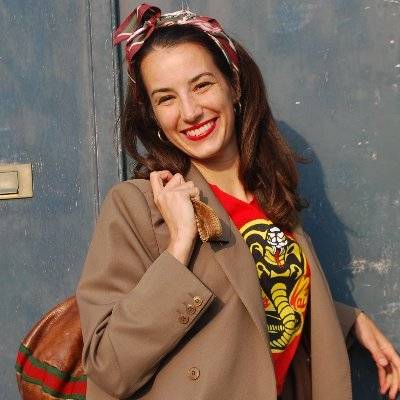“Why don’t I have the strength to chop off this bond with this country, Libya, which brings me so much suffering?” asks filmmaker Khalifa. He is giving voice to the reflections of guilt-torn actress Miriam. By then the people hearing these words knows it. They know that we don’t stop loving someone, or something, only because they are sick.
The other face of our pain for the world is our love for the world. This is the most important lesson we learn from the play Libya. Back Home. The show was conceived and directed by Paola Di Mitri, with texts by Miriam Selima Fieno, Giancarlo Fieno and Khalifa Abo Khraisse.
Presented on 15 and 16 October at the Romauropa Festival in Rome and staged by the company La ballata dei Lenna, the play is based on the research about her Libyan origins by Italian actress Miriam Selima Fieno. She also performs the entire play.
The world “home” is probably not the first thing that springs to mind when we think about Libya today. We generally don’t see this country as a hospitable place; a land to long for. Libya. Back Home challenges this perception. In the course of one hour, we see how the autobiographical narrative becomes the reconstruction of a collective memory.
The recollection starts with a period in history which has been long overlooked: Italy’s colonisation of Libya. Miriam starts telling the crude, harsh story of the “Libya Pacification” – or rather the “Libya Genocide” – by General Rodolfo Graziani, sent to North Africa by fascist dictator Benito Mussolini to “make Italy great again”.
READ: Palestinian Cinema in the Days of the Revolution
In the spirit of the Festival – born as a multimedia platform – Libya. Back Home brings multimedia art to the stage. Indeed, while Miriam performs her monologues, she also acts as a DJ of her own family memories tied to Libya.
In the background, one big screen shows us images of today’s Libya as well as back when it was an Italian colony. A smaller screen is connected to a small camera which Miriam holds on top of various photos and documents on a table. In this way the audience feels that they are peering over her shoulder.
![Actress Miriam Selima Fieno in Libya. Back Home, a play showcased at the Romauropa Festival in Rome [AndreaMacchia]](https://i0.wp.com/www.middleeastmonitor.com/wp-content/uploads/2019/10/2019_10-24-Libya.-Back-HomeLibya-Ph5_©AndreaMacchia.jpg?resize=1200%2C800&ssl=1)
Actress Miriam Selima Fieno in Libya. Back Home, a play showcased at the Romauropa Festival in Rome [AndreaMacchia]
We learn that Miriam’s grandfather was sent to Libya as a doctor. Through a series of serendipitous events, he fell in love with one of his Libyan patients, and the two married. After Muammar Gaddafi came to power in 1969, they were forced to leave the country, like all of the other Italians.
At one point in the play, we see Miriam staging her compulsion to go to Libya herself. This reveals itself to be a bureaucratic nightmare and virtually impossible. So in order to learn about today’s Libya, Miriam connects with three individuals living there. These are Salem, a Libyan cousin; Haidar, an Iraqi-born former professor of English at the University of Tripoli; and Khalifa Abo Khraisse, a journalist, documentary filmmaker and Tripoli correspondent.
Salem lives in Tripoli with his family and we learn his story through his videos and selfies. He comes to represent the most playful and friendly side of Libyans. He looks for what has become of the streets and places which Miriam’s father remembers, with poor results.
READ: The Book of Disappearance
The description of Libya we get from Prof. Haidar’s vision is much more shocking. Through his story we taste the sheer desperation of a man deprived of his liberty. He is a prisoner in Libya because of his political beliefs. He also suffers from health issues in the middle of a civil war. Haidar tries every way to escape Libya, including the infamous sea route across the Mediterranean.
Finally, we are introduced to filmmaker and journalist Khalifa. His tone is calm and poetic in the midst of the chaotic events he himself reports. He explains the complicated political scenario to Miriam and the audience. At the same time, through his words he restores a picture of beauty and dignity to his devastated homeland.
The stories of these three real-life characters intermingle, creating a nuanced, complex picture of Libya. Miriam starts feeling a sense of responsibility for each one of them, as well as the frustration and impotence at not being able to provide any help.
The play itself succeeds in balancing personal narratives with intimate stories; playfulness with dramatic events; the turbulent present and the colonial past. It contributes to the crucial task of excavating hidden histories, and conveying them through visuals, words and unconventional voices.
In the end, along with the protagonist of Libya. Back Home, we can’t help but acknowledge the impossibility of nailing down what Libya really is. A land of fantasies, a land of playfulness, a land of desperation, death, sickness, pain, destruction, poetry, sadness, danger, beauty, love and home. The play is an invitation to embrace all of those stories. To love all of them, even if it hurts. Especially when it hurts.




![2019_10-24-Libya. Back HomeLibya Ph4_©AndreaMacchia Actress Miriam Selima Fieno in Libya. Back Home, a play showcased at the Romauropa Festival in Rome [AndreaMacchia]](https://i0.wp.com/www.middleeastmonitor.com/wp-content/uploads/2019/10/2019_10-24-Libya.-Back-HomeLibya-Ph4_©AndreaMacchia.jpg?w=395&h=264&ssl=1)
![2019_10-24-Libya. Back HomeLibya Ph2_©AndreaMacchia Actress Miriam Selima Fieno in Libya. Back Home [Andrea Macchia]](https://i0.wp.com/www.middleeastmonitor.com/wp-content/uploads/2019/10/2019_10-24-Libya.-Back-HomeLibya-Ph2_©AndreaMacchia.jpg?w=395&h=263&ssl=1)
![2019_10-24-Libya. Back HomeLibya Ph1_©AndreaMacchia Actress Miriam Selima Fieno in Libya. Back Home [Andrea Macchia]](https://i0.wp.com/www.middleeastmonitor.com/wp-content/uploads/2019/10/2019_10-24-Libya.-Back-HomeLibya-Ph1_©AndreaMacchia.jpg?w=1196&h=797&ssl=1)








